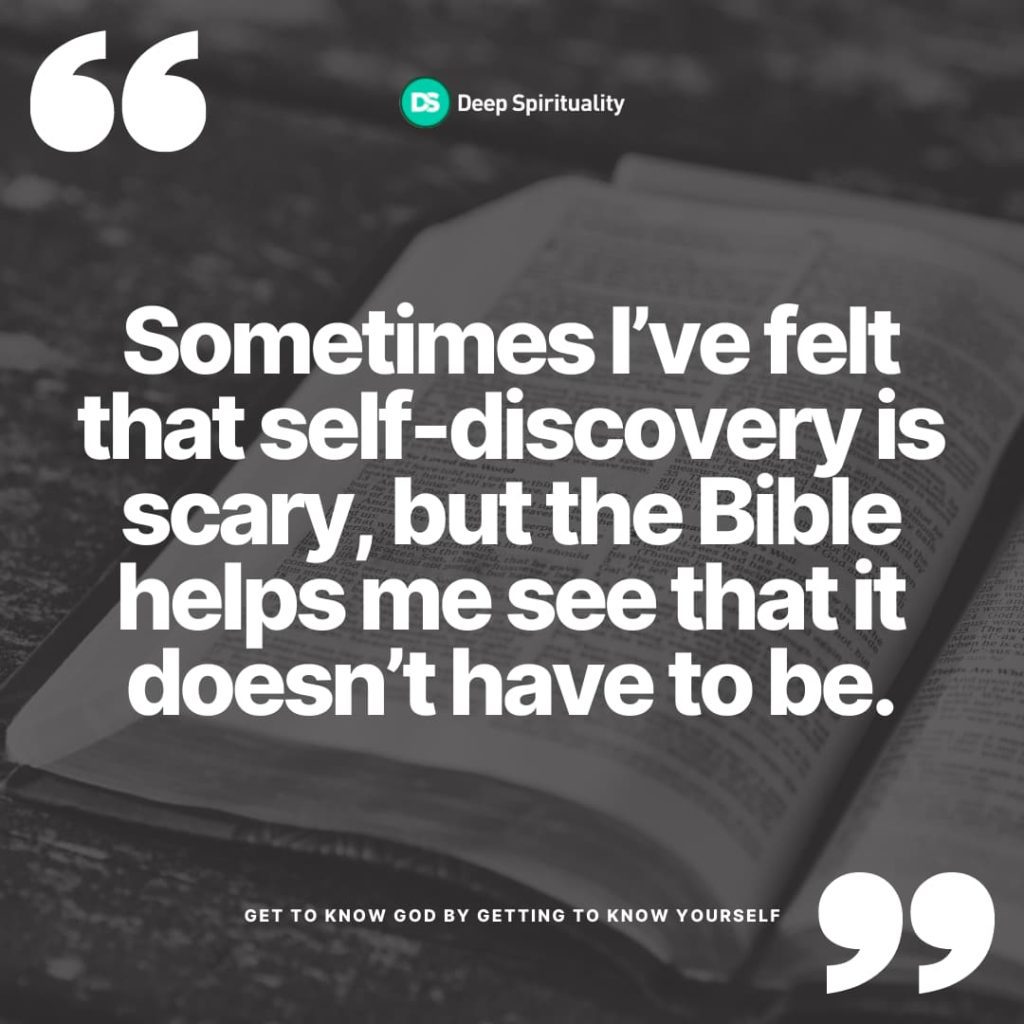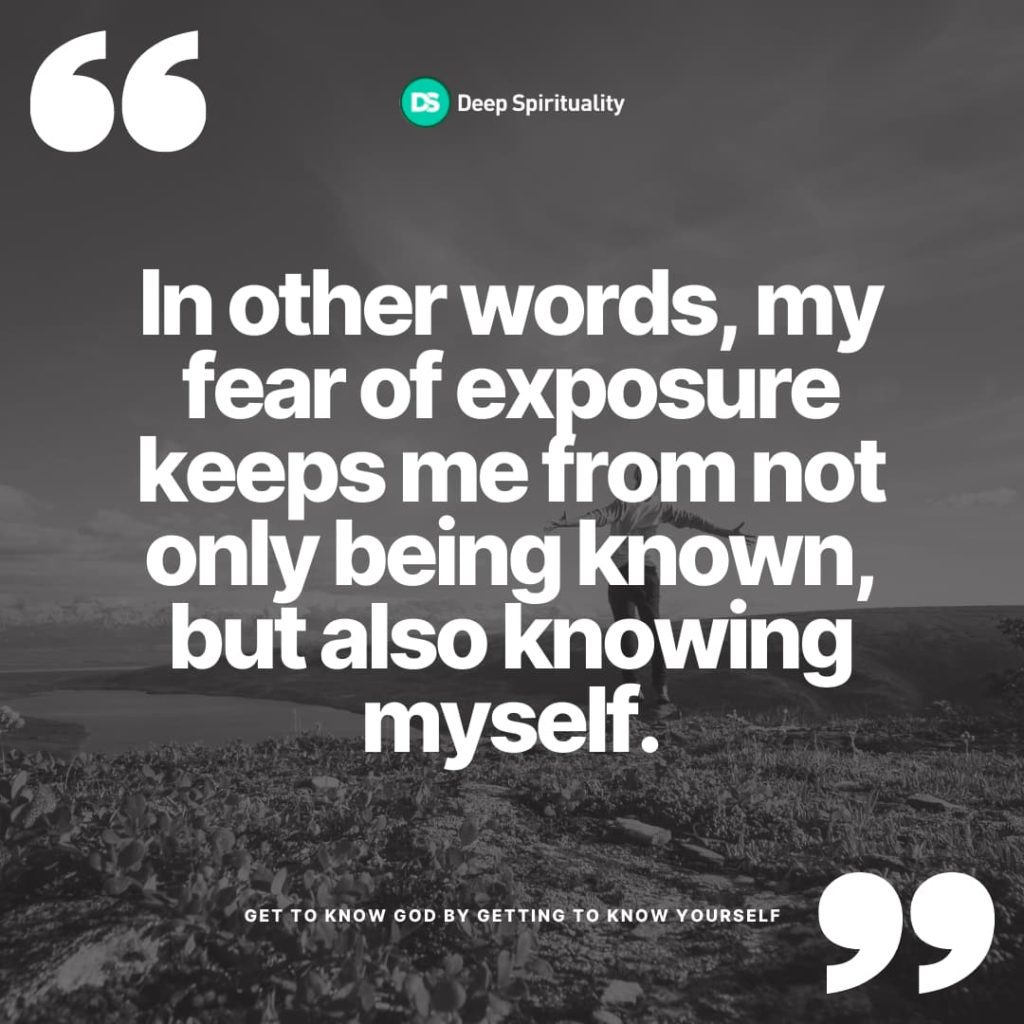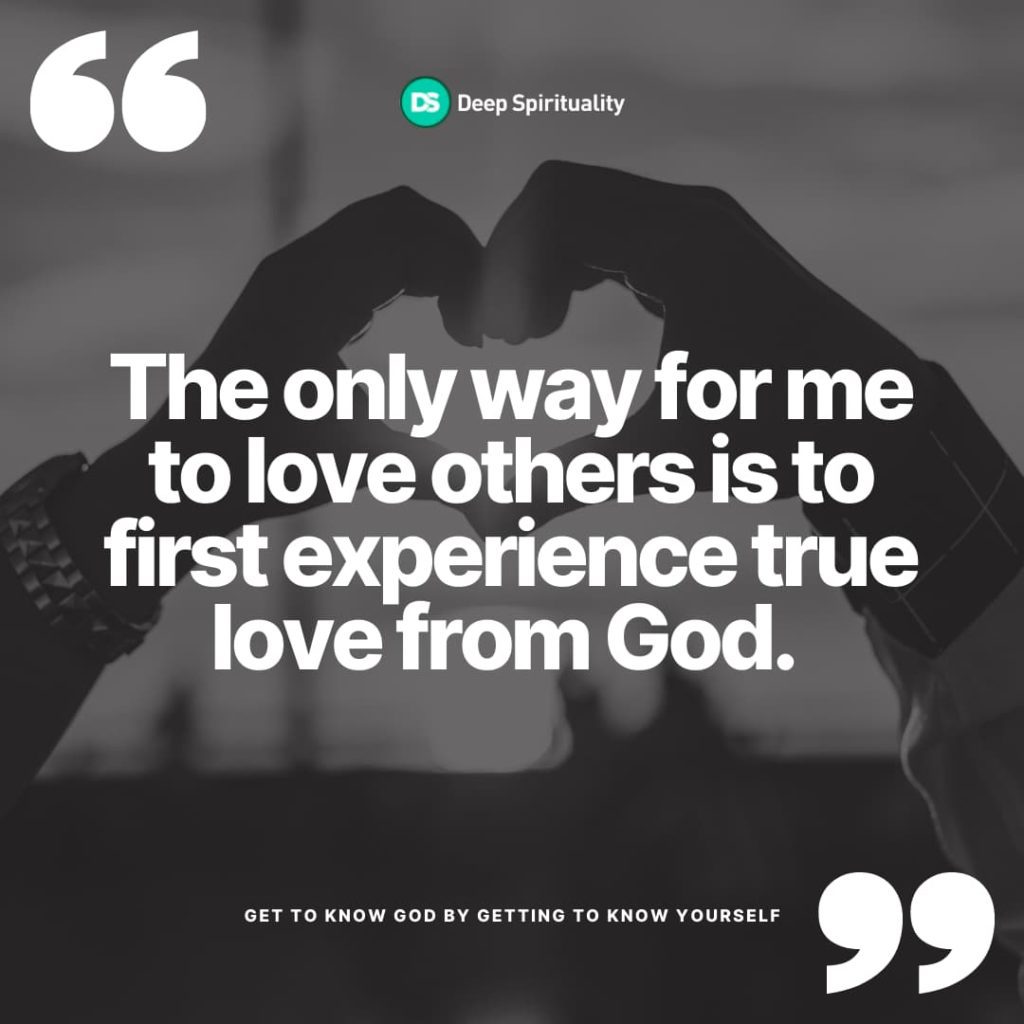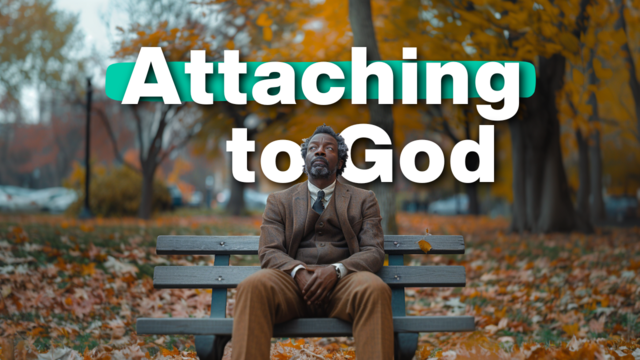When I was a student in high school, I dreamed about which college I would go to and what it would be like to be a student there.
I would ask my friends who already were in college all about their experiences and I even spent some weekends with them hanging out in their dorms and apartments.
But no matter how much I learned from other people, I had no idea what college was like until I moved in and experienced it for myself.
The same is true in relationships. Learning about someone secondhand is not the same as knowing them yourself. You might “know” a friend is sad, but that’s not the same as sitting with them and hearing them express their feelings, grief, and disappointments.
Those who think they know something do not yet know as they ought to know. But whoever loves God is known by God.
1 Corinthians 8:2-3 NIV
As we will explore in this devotional, having a close relationship with God means being known by God. It’s knowing who he is and letting him know you.
You may be wondering why you need to “let God know you” if he knows everything about you already. Well, he does know everything about you, but that’s not the same as hearing you share it. God wants a close relationship. He wants to know us intimately. He wants to experience who we are and what we feel.

To do that, he helps us develop self-awareness. He knows us well, and he helps us get to know ourselves too.
Sometimes I’ve felt that self-discovery is scary, but the Bible helps me see that it doesn’t have to be. Being aware of who I really am has helped me build close and secure connections with God and the people around me.
Reading the Bible can help us understand ourselves better, as we are now and as God destined us to be. Check out these 4 tips to deepen the intimacy you experience with God and others by letting God help you get to know yourself.
Let the Bible teach you about yourself
People read the Bible for many reasons, from intellectual curiosity to emotional comfort.
But if you want to read the Bible to build a close relationship with God, you’ll find that you need to let the Bible teach you about yourself too. Relationships are two-way, and if you aren’t aware of what you bring to the table you’ll have a hard time connecting with God.
Read More: How to Study the Bible (Even If You Don’t Like to Read)
When I read the Bible, especially the stories of Jesus’ interactions with people, I am amazed by how much I learn about myself from every person in the story. Perhaps this is one reason the Gospels are filled with examples of people interacting with Jesus; from each of them, we can become discover more about our relationship with God.
For example, let’s look at this time Jesus healed a paralyzed man:
One day while Jesus was teaching, some Pharisees and teachers of religious law were sitting nearby. (It seemed that these men showed up from every village in all Galilee and Judea, as well as from Jerusalem.) And the Lord’s healing power was strongly with Jesus. [18] Some men came carrying a paralyzed man on a sleeping mat. They tried to take him inside to Jesus, [19] but they couldn’t reach him because of the crowd. So they went up to the roof and took off some tiles. Then they lowered the sick man on his mat down into the crowd, right in front of Jesus.
[20] Seeing their faith, Jesus said to the man, “Young man, your sins are forgiven.” [21] But the Pharisees and teachers of religious law said to themselves, “Who does he think he is? That’s blasphemy! Only God can forgive sins!” [22] Jesus knew what they were thinking, so he asked them, “Why do you question this in your hearts? [23] Is it easier to say ‘Your sins are forgiven,’ or ‘Stand up and walk’? [24] So I will prove to you that the Son of Man has the authority on earth to forgive sins.” Then Jesus turned to the paralyzed man and said, “Stand up, pick up your mat, and go home!” [25] And immediately, as everyone watched, the man jumped up, picked up his mat, and went home praising God. [26] Everyone was gripped with great wonder and awe, and they praised God, exclaiming, “We have seen amazing things today!” Luke 5:17-26 NLT
As I read this, each person helps me ask questions and discover things about myself:
- The teachers of religious law – Do I “show up” all the time to listen to Jesus’ teachings while questioning them in my heart?
- The person in need – What are some things in my life that I feel powerless to change, and need help from God and friends around me?
- The people carrying their friend to Jesus – how can I love those God has placed around me?
- Jesus – how can I choose to respond to all these things to live out my God-designed destiny?
Uncovering our heart is an important part of our relationship with God. The goal of this isn’t to grade ourselves or get down on ourselves, but rather understand ourselves so we can talk to God about what we learned and get closer to him.
We can also understand from this story how Jesus feels about us. Jesus is himself God in human flesh (John 1:18) and when we read about how he interacts with people we can understand how God feels toward us. For example, one thing this story teaches us is that God responds with kindness and miraculous healing when we’re weak and “paralyzed.”
If we don’t admit truths about ourselves — like the ways we feel weak and paralyzed — we’ll have a hard time emotionally connecting with what we read in the Bible.
Pause and reflect
- How do you feel about getting to know yourself better? Why?
- What are some things you learn about yourself from the story above?
- How much effort do you usually make to get to know yourself as you read the Bible?
Take action
- Choose to pursue a deeper reading of the Bible every day.
- As you read or listen to the Bible, practice slowing down and ask questions about how you see yourself in the verses and talk to God about what you learned.
Uncover your heart to build intimacy
For the word of God is alive and active. Sharper than any double-edged sword, it penetrates even to dividing soul and spirit, joints and marrow; it judges the thoughts and attitudes of the heart. [13] Nothing in all creation is hidden from God’s sight. Everything is uncovered and laid bare before the eyes of him to whom we must give account.
Hebrews 4:12-13 NIV
The Bible is God’s Word, and his words have a destination: our heart.
The Bible will address the thoughts, attitudes, feelings, choices, desires, and motives we carry with us in our hearts. These verses say the Bible judges those things. However, this type of judging is not negative and condemning. This judgment is simply to tell us what is true.
I have a friend who likes to joke with me about which of us is taller. This was especially fun when we were in the pandemic and only communicating virtually. While he and I could argue all day about who is actually taller, and if shoes were giving someone an advantage, or if it was the hair making one of us look taller than the other, the true judgment on my height comes when I go to the doctor’s office.

At the doctor’s office, they have a tool to measure my height, and once it’s measured, there is no arguing with the judgment. Whatever height I am measured at is not necessarily good or bad, it’s just what is true.
The same is true with the Bible. Too often I want to ignore the truth about the thoughts and attitudes of my heart. If I perceive them as “bad” I believe it means that I have failed, didn’t measure up, or am not good enough. None of this is true.
The Bible is God’s Word, and his words have a destination: our heart.
When God uncovers my heart, he does this with this desire for intimacy. As Hebrews 4:13 says, “everything is uncovered and laid bare”, or in other words, exposed and naked, an intimate expression of how God feels about me and how close he wishes to be.
He wants me to see these truths because he wants honesty in our relationship, not perfection (Psalm 51:6). He wants me to choose to reveal my heart to him in vulnerability (Genesis 4:6). He wants me to go to him in my excitement for my victories, cry on his shoulder in my sorrows, hold on to him in my fears, and so on.
How I feel in return depends on how I feel about the relationship. I can feel safe and secure in this, or anxious and afraid.
At the end of the day, God desires to know me, not just to know about me. He wants to experience intimately who I really am.
God’s Word will uncover truths about our hearts, but the choice we each have to make is how we will respond to those truths:
So, as the Holy Spirit says: “Today, if you hear his voice, [8] do not harden your hearts as you did in the rebellion, during the time of testing in the wilderness
Hebrews 3:7-8 NIV
It is easy for me to choose to harden my heart to the truths that God wants me to hear about myself, rather than be willing to see and hear what God is communicating to me.

For example, when I experience anxiety and fear, I usually want to numb my heart to it instead of listening to what God has to say about why I’m anxious and what to do about it.
I would much rather try to make these feelings go away by immediately problem-solving or by ignoring them completely and watching TV or reading about my favorite sports teams.
But instead of hardening my heart to my anxiety, I can let my anxiety lead me to God through vulnerability. When I harden my heart, I miss the encouragement and truth God really wants me to hear: that he is good and I can trust him.
This is one of the greatest weaknesses in my relationship with God. But I’m learning that when I choose to slow down, trust God, and listen while I let him guide me to himself through the circumstances and emotions I experience, I am able to find the joyful, free, and fulfilling destiny God has for me through an intimate relationship with him and others.
Pause and reflect
- What do you feel most tempted to harden to in your life?
- How do you think you could practice being vulnerable with God instead of hardening?
- What encouraging truths might you be missing out on from God when you harden your heart instead of being vulnerable?
Take action
- Vulnerably trust God by sharing your emotions with him and then choosing to give them up to him in trust.
Step into the light and become a light
In him was life, and that life was the light of all mankind. [5] The light shines in the darkness, and the darkness has not overcome it.
John 1:4-5 NIV
Jesus was “the light of all mankind.” What the Bible calls “light” is a beacon that reveals the path for us to follow. When we embrace it and follow it, we become a light as well.
For you were once darkness, but now you are light in the Lord. Live as children of light [9] (for the fruit of the light consists in all goodness, righteousness and truth) [10] and find out what pleases the Lord. [11] Have nothing to do with the fruitless deeds of darkness, but rather expose them. [12] It is shameful even to mention what the disobedient do in secret. [13] But everything exposed by the light becomes visible—and everything that is illuminated becomes a light.
Ephesians 5:8-14 NIV
The light is many things, like goodness and righteousness, but it is also truth. It is truth that is exposing. And most notably, it exposes the “fruitless deeds of darkness” in both our lives and those around us.
There are four kinds of “fruitless deeds of darkness” I have seen in my life that I don’t like to bring into the light:
- The things I know are bad: Some things make me feel so ashamed and guilty that I don’t ever want to do them again. But I also feel so afraid of judgment that I keep them hidden.
- The things I don’t want to feel bad about: In this category are things I do feel bad about, but don’t want to feel bad about or stop. So I tell myself they’re not a big deal or they’re okay.
- The things I no longer feel bad about: These are the things that no longer bother my conscience because I’ve ignored or deceived myself. I am not very aware of them and therefore don’t expose them.
- The things I don’t think are bad at all: These are the deeds of darkness I start to actually call “goodness” because of my denial. I will defend myself hard if anyone tries to question me on these things.
What sorrow for those who drag their sins behind them with ropes made of lies, who drag wickedness behind them like a cart!
Isaiah 5:18 NLT
When we lie, deceive, and conceal the truth of our sins, we are unable to change. Our lies act like ropes, carrying our wickedness with us. When I am honest about my sin with God and those around me, I am able to change.
One of the greatest ways I have gotten to know myself in life is through honesty with others who are walking in the light as well (Proverbs 20:5). Those who have welcomed light into their own life can help shine a light on truths in my life that I have been unable or unwilling to see.

This is the verdict: Light has come into the world, but people loved darkness instead of light because their deeds were evil. [20] Everyone who does evil hates the light, and will not come into the light for fear that their deeds will be exposed. [21] But whoever lives by the truth comes into the light, so that it may be seen plainly that what they have done has been done in the sight of God.
John 3:19-21 NIV
Too often my natural inclination is to run from the truth rather than embrace it. Instead of exposing my deeds of darkness to myself, God, and others, I choose to hide in fear of exposure.
At the core, my fear is connected to the belief that if people knew me, then I would not be loved or accepted. So I hide my flaws and start substituting pleasure and comfort for true intimacy and love. Then, I resist discovering truth about myself because I am afraid it will disrupt that comfort.
In other words, my fear of exposure keeps me from not only being known, but also knowing myself.
This way of living is empty. I never get true fulfillment from living for pleasure, nor do I feel loved by those around me who do not truly know me.
When I choose to admit that real fulfillment, comfort, peace, and strength come from intimately connecting with God and others, then I am willing to step into the light to get to know myself and reveal myself to others.
Pause and reflect
- How do you feel about exposing “fruitless deeds of darkness” in your life?
- What are some examples of things you deceive yourself and/or others about? Who can you be honest with today to expose these things?
- How has your attitude toward truth and light been affecting the intimacy of your relationships?
Take action
- Choose a few people you wish to create intimate connections with and pursue their friendship today through complete honesty.
Get to know yourself and get to know God’s love
He came into the very world he created, but the world didn’t recognize him. [11] He came to his own people, and even they rejected him. [12] But to all who believed him and accepted him, he gave the right to become children of God… [14] So the Word became human and made his home among us. He was full of unfailing love and faithfulness. And we have seen his glory, the glory of the Father’s one and only Son.
John 1:10-12,14 NLT
Jesus came to a world that was created by him, through him, and for him and yet was rejected by those he loves. He did this so that we ourselves would not be rejected but instead be accepted into God’s family as his children. This is what everything is about for God: love, intimacy, family.

However, unless we get to know ourselves, we won’t be able to experience the fullness of living in God’s loving and intimate family.
When we were utterly helpless, Christ came at just the right time and died for us sinners. [7] Now, most people would not be willing to die for an upright person, though someone might perhaps be willing to die for a person who is especially good. [8] But God showed his great love for us by sending Christ to die for us while we were still sinners.
Romans 5:6-8 NLT
Seeing the sinfulness of our hearts enables us to understand how much God really loves us. He chose us at our worst, bringing us close to him because of his grace, not our performance. In doing this, God displayed the ultimate form of love: loving us for who we are rather than what we offer or how we perform.
We can’t out-sin God’s love (Romans 8:38-39). Rather, the more we see our sin, the more we see his love for us. This is the reason God wants us to get to know ourselves: so that we can see and experience his love in an intimate relationship with him, and in turn, share this love with others.
This is love: not that we loved God, but that he loved us and sent his Son as an atoning sacrifice for our sins. [11] Dear friends, since God so loved us, we also ought to love one another… [19] We love because he first loved us.
1 John 4:10-11,19 NIV
The only way for me to love others is to first experience true love from God.
For most of my life, I have lived in the pursuit of something I do not yet have, rather than living in gratitude for what I already possess. I have lived searching for love and fulfillment that I did not yet possess, so I felt I needed to prove myself and my worth to others around me through academic, athletic, and social performance.
But understanding how much God loves me and building an intimate friendship with him satisfies that need for love. I don’t need to live searching for it. Instead, I can live driven by the gratitude and peace I feel because I know I am already loved.
When I live this way, I no longer feel anxiously consumed with myself, but am freed up to give love to others.
The only way I can get there is through knowing myself. I have to see the truth of my heart, my sin, and the choices I have made, and simultaneously see God and his love for me shown through Jesus.
Pause and reflect
- How do you feel about seeing and admitting your sin to yourself, others, and God?
- How do you feel about knowing that God loves and chooses you even when you are at your worst?
Take action
- Pick a few spiritual, trustworthy people you know well and will tell you the truth.
- Be open about your sins with them and ask them for their input and what they see in you that you may have missed.
Next steps
When I, in getting to know myself, discover that God offers me the love I am looking for that I cannot find anywhere else, my response is to love him in return and find ways to share this love with others.
This is the power of getting to know ourselves with God. We share ourselves with him, and live intimately in a loving relationship with him, and with other people.
- Read the book of John and see what you can learn about yourself.
- Study the Psalms to see how you can relate to the psalmist and see what a vulnerable walk with God looks like.
- Learning to Engage God Mentally and Emotionally
- How to Have a Change of Heart, From the Life of King David
Explore more:
An alum from both Santa Clara University and Stanford University, Nick is passionate about helping people see God from a new perspective, and is an occasional contributor to the Deep Spirituality writing team.
An alum from both Santa Clara University and Stanford University, Nick is passionate about helping people see God from a new perspective, and is an occasional contributor to the Deep Spirituality writing team.





